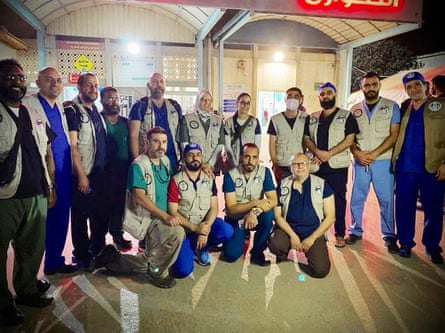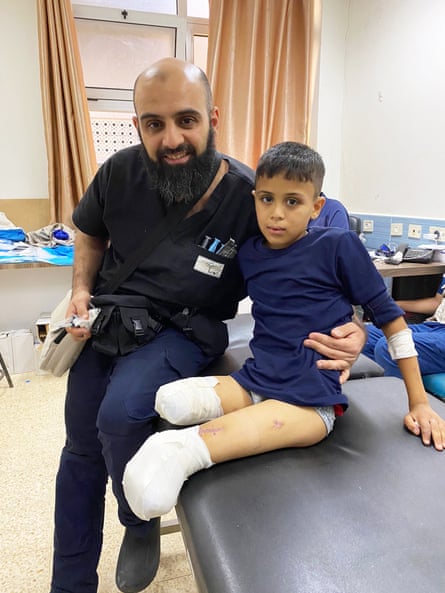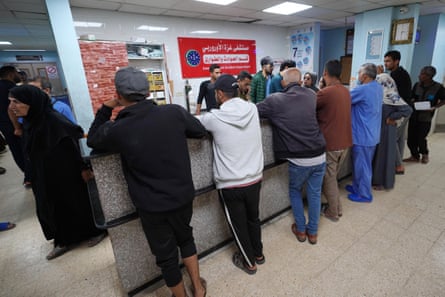An Australian doctor trapped inside one of Gaza’s few remaining functioning hospitals has urged the Australian government to do more to get him and his colleagues out and additional medical aid in.
Sydney-based Dr Modher Albeiruti is among 16 international doctors and medical workers who have been stranded inside the European hospital in Khan Younis since Israel took control of the Palestinian side of the Rafah border crossing this month.
“The message is try to get us out before we have another Zomi Frankcom,” he told Guardian Australia, in reference to the Australian aid worker for World Central Kitchen who was among seven people killed in strikes by Israeli armed drones in April.
“Push to reopen the borders to get aid and medical missions to the Gazans.”
The US government has evacuated 17 of its nationals from the cohort but healthcare workers from other countries – reportedly the UK, Australia, Egypt, Jordan and Oman – remain stranded.

Albeiruti, who works as an emergency physician at Wollongong and Fairfield hospitals, entered Gaza on 1 May for a two-week medical mission with the US-based Palestinian American Medical Association.
He said his delegation had been due to leave Gaza on 13 May – to be replaced by another cohort of volunteer health professionals who had been gathered on Gaza’s border with Egypt.
But those plans were thrown into disarray when the Irael Defense Forces seized the Rafah crossing on 7 May, closing the sole entry and exit point for international humanitarian workers.
“We finished our mission almost a week ago, we are getting pressure from our families, they are extremely worried,” he said. “We are also exhausted after almost three weeks.”

The group of doctors of which Albeiruti is part brought suitcases full of medical supplies into Gaza but he said they were fast running out.
“Every mission when they come they bring lots of supplies with them so they can function – everything is getting less and less,” he said.
He said he fears the hospital will soon be “next” as Israel defies international warnings and pushes ahead with its invasion of Rafah where more than 1.4 million Palestinians have taken refuge.
Albeiruti said he had had brief contact with one Australian official.
“I urged them to get us out, the whole team, it is not ethical for me to leave my team alone, we need to leave, we need to leave as a team,” he said.
“The Americans acted on behalf of their citizens and neglected all the other nationalities in the team,” he said.
A spokesperson for the Department of Foreign Affairs and Trade confirmed it “is providing consular assistance to an Australian in Gaza” but added, “owing to our privacy obligations we cannot provide further comment”.
Guardian Australia understands the Australian government has raised his case with Israeli authorities.
after newsletter promotion
Healthcare in Gaza has been crippled by ongoing Israeli bombardment.
According to the World Health Organization, 23 of the 39 hospitals in Gaza are no longer functioning and those that are still operational are overwhelmed by the number of patients, the severity of their injuries, and the dwindling resources with which to treat them. Supplies of pain medication, antibiotics and even bandages are running short: doctors report operating without anaesthetic.
Thousands of displaced Gazans are also taking shelter in hospitals, faced with nowhere else to go and choosing the relative safety of hospital corridors.

The southern Gazan city of Rafah – just south of Khan Younis – has a usual population of just under 300,000. It swelled to more than 1.5 million people over the initial months of the conflict, as displaced Palestinians fled bombardment and sought sanctuary in Gaza’s south.
But, after a warning from the IDF before its initial attacks on Rafah, at least half a million civilians have fled the city. Roads heading north and west are described as being choked with cars, trucks, trolleys and pony carts laden with people and their possessions.
There are acute shortages of food, fuel and clean water in Gaza and aid convoys into the territory have been attacked by Israeli settlers. A US military-built floating pier – anchored to the beach in Gaza – has been completed and will start ferrying humanitarian supplies within days.
Amid the chaos of ongoing bombardments, massive people movements and a re-shuttered Rafah crossing, international doctors who have completed rotations in Gaza have found themselves trapped inside the occupied territory.
The White House national security spokesperson, John Kirby, said 17 out of 20 US doctors stuck in the territory had been evacuated last week.
Three chose to stay in solidarity with international and Palestinian colleagues.
“I can assure you that any of [the US citizens] that wanted to leave are out,” Kirby said.
But healthcare workers from other countries remain stranded, without information on when the Rafah crossing might reopen to them. New medical teams waiting to come into the territory are similarly stranded on the other side of the border.
